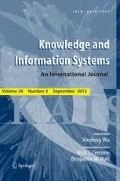Abstract
This paper focuses on extensions of Abstract State Machines (ASMs) for the benefit of a refinement calculus in the area of data-intensive applications, in particular data warehouses and on-line analytical processing. The extensions lead to a typed version of ASMs and a more specific notion of strong data refinement, which incorporates the preservation of information content by means of schema dominance. Each typed ASM can be effectively translated into an equivalent ordinary one. Providing typed ASMs helps to exploit the existing logical formalisms used in data-intensive applications to define a ground model. Furthermore, strong data refinement helps to set up a refinement-based development method that uses provably correct standard refinement rules.
Similar content being viewed by others
References
Börger E (2003). The ASM refinement method. Form Asp Comput 15: 237–257
Börger E and Stärk R (2003). Abstract State Machines. Springer, Berlin
Gyssens M, Lakshmanan L (1996) A foundation for multidimensional databases. In: Proceedings of the 22nd VLDB conference, Mumbai (Bombay), India
Liu J, Vincent MW and Mohania M (2003). Maintaining views in object-relational databases. Knowl Inf Syst 5(1): 50–82
Lee KCK, Va Leong H and Si A (2000). Incremental view maintenance for mobile databases. Knowl Inf Syst 2(4): 413–437
Lewerenz J, Schewe K-D, Thalheim B (1999) Modelling data warehouses and OLAP applications using dialogue objects. In: Akoka J, Bouzeghoub M, Comyn-Wattiau I, Métais E (eds) Conceptual modeling—ER’99. LNCS, Springer, Heidelberg, vol 1728, pp 354–368
Lin W-Y and Kuo I-C (2004). A genetic selection algorithm for olap data cubes. Knowl Inf Syst 6(1): 83–102
Link S, Schewe K-D, Zhao J (2006) Refinements in typed abstract state machines. In: Proceedigs of the Perspectives of systems informatics—PSI 2006. Novosibirsk, Russia
Ma H, Schewe K-D, Thalheim B and Zhao J (2005). View integration and cooperation in databases, data warehouses and web information systems. J Data Semant IV: 213–249
Schewe K-D and Schewe B (2000). Integrating database and dialogue design. Knowl Inf Syst 2(1): 1–32
Thomson E (2002). OLAP solutions: building multidimensional information systems. Wiley, New York
Widom J (1995) Research problems in data warehousing. In: Proceedings of the 4th international conference on information and knowledge management. ACM
Zhao J and Ma H (2006). ASM-based design of data warehouses and on-line analytical processing systems. J Syst Softw 79: 613–629
Author information
Authors and Affiliations
Corresponding author
Rights and permissions
About this article
Cite this article
Schewe, KD., Zhao, J. Typed Abstract State Machines for data-intensive applications. Knowl Inf Syst 15, 381–391 (2008). https://doi.org/10.1007/s10115-007-0083-5
Received:
Revised:
Accepted:
Published:
Issue Date:
DOI: https://doi.org/10.1007/s10115-007-0083-5



